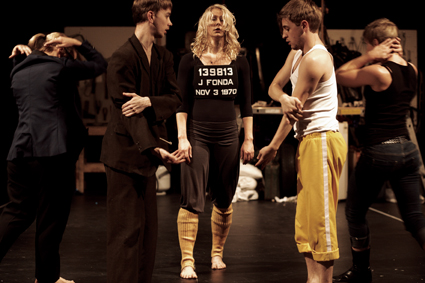explorations in the missing centre
josephine wilson: personal political physical challenge

Heath Barrett, Rachel Ogle, Martin Hansen, Personal Political Physical Challenge, Hydra Poesis
photo Traianos Pakioufakis
Heath Barrett, Rachel Ogle, Martin Hansen, Personal Political Physical Challenge, Hydra Poesis
THE OPENING SCENE OF THIS INTRIGUING NEW WORK BY PERTH COMPANY HYDRA POESIS RESEMBLES A REHEARSAL FOR A SERIES OF DOOMED COME-BACKS. A MAN STUMBLES BLINDLY ACROSS THE STAGE IN AN ENORMOUS KARL MARX HEADPIECE. ANOTHER SPORTS THE WIG AND TIGHTS OF A FRENCH ARISTOCRAT, WHILE A WOMAN WHO LOOKS A LOT LIKE JANE FONDA DOES HER BEST TO WORK IT ALL OUT IN A SCOOP-NECKED, CLAMMY NYLON LEOTARD AND KNITTED LEGGINGS. THEIR ENCOUNTERS ARE CLUMSY; THEIR BRIEF ENSEMBLES DO NOT ENDURE.
The roller-door lifts on a young middle-class suburban couple. Their malcontent is narrated by a tyrannical MC: “Happiness has become boring,” she spouts on behalf of the woman. “Pleasure is boring…Food is boring…Our lifestyle is not a life…I want to be something more;” she wants “drama and resistance.” In a garage filled with props from the local Bunnings, the performers borrow from worn-out manuals of terror. Scenes of Maoist self-criticism are followed by basement interrogations. Ethical double binds leave the couple on different sides of the fence. Their union under threat, they join forces in a parody of enslaved labour, moving bags of cement about the garage in repetitive and meaningless acts of physical endurance.
In Personal Political Physical Challenge director Sam Fox and his talented collaborators offer a comic vision of an (a)political present desperately repeating the stereotypes of a political past—the first time as tragedy, then as farce. The audience is offered an abridged history of ambiguous truth-status that goes something like this: in the 1970s Jane Fonda abandoned Vietnam and found(ed) aerobics. With the failure of Marxism and the Fall of the Wall in 1989, we dispensed with the Brotherhood and the Internationale (performed nostalgically or humorously—the modality is ambiguous—by Martin Hansen), acquired a home loan and set to work on our privatised spaces of house and body. Cut to 2010. If a higher cause is needed, there is Live Art, there is ballet and Pilates and contemporary dance to stand in for physical capital. In the absence of hard work, girls and boys, we can work hard.
There are moments of poignancy and clarity in this provocative work. The choreography is tenuous, desperate, the unions fragile. The movement feels open-ended and exploratory, as befits a small budget, limited rehearsal time and good ideas. The composition by Stina Thomas drives us towards the very intensity of yearning that lies at the core of the performance. With self-realisation and belonging no longer possible through identification with the Workers and other Grand Narratives, how do we register intensity and ecstasy? Where is that ‘something more’ to be found?
Beyoncé’s “Halo” is playing. Martin Hansen is naked but for a set of placards stacked around his neck. Rachel Ogle is dancing next to him. He flips the cards and delivers her a series of hand-written directives. To the tune of a perfect Hegelian hit, Rachel Ogle closes her eyes and attempts transcendence. It is a schizophrenic little narrative that Hansen engenders, brilliantly capturing the absurdity of the individual subject’s contemporary predicament. Over-interpolated and under-resourced, Rachael Ogle does her best to follow the provocations. Privatised loungeroom subjectivity (“Dance Like Nobody is Watching”) is followed by unbearable public scrutiny (“But They Are—The Whole World is Watching”), which leads to self-aggrandising and terrifying globalised responsibility (“And The World is on your Shoulders”). In the flip of a board there remains global holocaust (“And the World is on Fire”), and personal humiliation (“And You are Naked”).
While the movement, sound and choreography articulate this yearning through intensity and repetition, the spoken text is less rigorously conceived. Rich undecidability sometimes gives way to confusion. As set out in the director’s notes, ambiguity in the performance mirrors a contemporary absence of political direction. We lack in Australia “clear benchmarks of political belief.” So we find ourselves in late 2010, at the end of Politics and Meaning, performing rigorous workouts which stand in for the absence of work (in the Marxist sense). At the risk of being horribly literal (Stalinist?), I wonder what is lost and gained in exploring that void (if it exists) through old truisms of terror borrowed from the bogies of Marxism and Maoism—albeit in an ambiguously comic turn? A strange choice for a set of artists well under 40, I thought. The rich discourse of resistance may have lost its centre, and there were plenty of people all over the world who were pretty happy about that. But if you ask me, there is no shortage of things to get worked up about closer to home. On the ground and in the sky.
Hydra Poesis in association with PICA, Personal Political Physical Challenge, director Sam Fox, choreographic collaboration Martin Hansen, Rachel Ogle, Sam Fox and dancers, performers Rachel Ogle, Martin Hansen, Bianca Martin, Heath Barrett, Kathryn Puie, composer Stina Thomas PICA Performance Space, July 16-20
RealTime issue #99 Oct-Nov 2010 pg. 31






